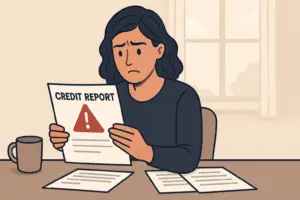Identity theft occurs when someone steals your personal information for their financial gain. If the thief is your spouse or another relative—while that can make the situation more complicated—it is still considered identity theft and your family member has violated your legal rights. The identity theft lawyers at Schlanger Law Group have extensive experience helping victims of family fraud. Recently, we filed a student loan identity theft lawsuit on behalf of a husband whose wife opened several school loans using his information without his knowledge.
How does Student Loan Identity Theft Happen?
Most identity thieves use stolen personal information to access bank accounts, open credit cards, and steal financial benefits from strangers. A study published at the end of 2021 revealed that one-third of US citizens have dealt with identity theft and 15 million Americans become identity theft victims every year. In 2020 alone, the Federal Trade Commission received 2.2 million identity fraud reports and overall financial losses reached $56 billion.
A growing number of ID theft victims know their thieves and may even be related to the person. Family identity fraud has been reported:
- Among siblings,
- In situations involving an elderly relative who is victimized by their caretaker,
- When parents use their minor child’s information to qualify for utilities or credit cards, and
- Between spouses and ex-spouses who cannot obtain financial benefits on their own or simply want to hurt their partner.
Spousal identity theft is a leading cause of divorce and can be difficult to prove to creditors, especially if joint accounts already exist. Student loan identity theft usually happens when one parent wants to further their own education or pay for a child’s education and the other parent either can’t afford the cost or refuses to take on the debt.
When Loan Companies Won’t Listen
Our client’s situation is just one example of how spousal identity theft can cause tremendous damage. Mr. Clark was separated from his wife and had filed for divorce. During the divorce case, he learned that two years earlier his wife applied for three student loans on behalf of their adult children. Combined, the three loans totaled $154,000. His wife listed Mr. Clark as a co-signor, forged his signature, and provided her email address in place of his contact information so he would not know what she had done.
As soon as Mr. Clark learned about the student loans, he contacted each loan company to dispute his responsibility. None of the three loan providers would take his name off the loans or otherwise correct the fraud. During a call with one of the loan companies, Mr. Clark learned that his wife asked the company to block his access to the loan information.
Mr. Clark filed a police report and provided the report to the loan companies. He also filed a complaint with the FDIC, to no avail. All three loan companies refused to acknowledge the identity theft and would not remove him from the loans. Instead, once Mr. Clark supplied his correct contact information, the lenders began sending him demand letters.
The Credit Reporting Agencies’ Role in this Dilemma
Mr. Clark also contacted the three major credit reporting agencies (CRAs)–Experian, Equifax, and TransUnion. Each CRA had included the student loans in Mr. Clark’s credit reports. He explained his wife’s identity theft and asked to have his reports corrected.
Although Mr. Clark sent several dispute letters and supplied information to support his claim of student loan identity theft, all three credit bureaus refused to correct the reports or show that the loans were disputed. TransUnion told Mr. Clark that the loan information had been verified by the loan companies so the loans would not be removed from his credit reports.
The FCRA Controls How Loan Companies and Credit Bureaus Must Respond to Consumer Disputes
The Fair Credit Reporting Act (FCRA) was enacted to ensure accurate credit reporting and to protect consumers who discover inaccurate information in their credit reports. Often, identity theft victims first learn about the loss of their personal information when they review their credit reports.
If you discover an error in your credit report, you should file a written dispute with each CRA as soon as possible. The CRA will notify the creditor that reported the information, but you can also notify the creditor directly. The key is to contact the credit reporting agencies first to qualify for FCRA protection.
Upon receiving a consumer dispute, the CRA and the creditor must investigate the claim to determine whether the reported information is true. The FCRA establishes a certain timeframe for the agencies and creditors to perform an investigation, report their findings, and correct any erroneous information. If the CRA or creditor does not perform a reasonable investigation, report their findings, or correct false information, the consumer is entitled to monetary remedies.
Specifically, when a creditor or CRA violates the FCRA, a consumer may recover actual damages (which can include out-of-pocket expenses as well as compensation for damage to their credit and emotional distress), statutory damages from $100 to $1,000 if the violations are considered willful, and punitive damages in certain situations. The violating companies will also be required to pay the consumer’s attorney’s fees and costs.
When Credit Bureaus and Creditors Refuse to Acknowledge Student Loan Identity Theft, Turn to an Experienced FCRA Litigation Lawyer
After many attempts to correct his credit reports and remove his name from the student loans opened by his estranged wife, Mr. Clark had reached a dead end. When we learned his story, we jumped into action and brought a lawsuit against the three credit bureaus and all three loan companies. Our goal is to enforce Mr. Clark’s legal rights, recover the financial compensation he deserves, and remove his liability for the loans he never agreed to pay.
The dedicated attorneys at Schlanger Law Group are passionate advocates for identity theft victims and other consumers who are stonewalled by companies that ignore the law and disregard consumers’ rights. For a free case consultation, call (212) 500-6114 or complete our simple contact form today.







